- Home
- Josephine Tey
Kif: An Unvarnished History
Kif: An Unvarnished History Read online
Kif: An Unvarnished History
By
Josephine Tey
TO M
WHO MIGHT HAVE LIKED IT
OR MIGHT NOT
BUT IN ANY CASE
WOULD HAVE BEEN PLEASED
Table of Contents
CHAPTER ONE
CHAPTER TWO
CHAPTER THREE
CHAPTER FOUR
CHAPTER FIVE
CHAPTER SIX
CHAPTER SEVEN
CHAPTER EIGHT
CHAPTER NINE
CHAPTER TEN
CHAPTER ELEVEN
CHAPTER TWELVE
CHAPTER THIRTEEN
CHAPTER FOURTEEN
CHAPTER FIFTEEN
CHAPTER SIXTEEN
CHAPTER SEVENTEEN
CHAPTER EIGHTEEN
CHAPTER NINETEEN
CHAPTER TWENTY
CHAPTER TWENTY-ONE
CHAPTER TWENTY-TWO
CHAPTER TWENTY-THREE
CHAPTER TWENTY-FOUR
CHAPTER TWENTY-FIVE
CHAPTER TWENTY-SIX
CHAPTER TWENTY-SEVEN
CHAPTER TWENTY-EIGHT
CHAPTER TWENTY-NINE
CHAPTER ONE
The boy stepped into the chill dark of the winter morning and closed the door quietly behind him. Quietly because the wife of Farmer Vass was apt to be unreasonable if she were wakened betimes. It lacked an hour till dawn and there was neither earth nor sky, hedge nor horizon. Only the all-enveloping dark, immediate, almost tangible—the blackness that hems us in with ourselves and annihilates philosophy. And it was bitterly cold. The boy clutched at his coat collar as the thin sterile air struck at his bare throat. His hobnailed boots echoed irrelevantly—a dreary sound—as he made his stumbling way over the cobbles of the yard and fumbled for the lantern that hung at the stable door. His sleep-sodden brain which had brought him thus far mechanically was waking to its daily passion of revolt.
God! what a life! What a bloody dam-fool life! A day that began with fumbling in the dark and ended fumbling in another dark, and in between a long procession of monotonous jobs, impersonal and void of interest. A life of fastening buckles, he thought venomously, as his rapidly stiffening fingers refused their office. Buckle-fastening! When life was so short and there was so much of the world. Even those high new-born pearly dawns of summer that lifted his heart with their wonder were but urgent invitations to set out and see. He wanted passionately wanted—a life where things happened; where the unexpected swung at you with a terrifying beauty and events were not, since every hour brought its event. The phlegm, the appalling foreverness of the fields and hills roused in him a desperate consciousness of his own evanescence, and a rebellion that any part of his short and so precious time should be given to their thankless service. And what was there beyond his work to make it worth while? To sit in winter at the farmhouse kitchen fire while Johnny, the other hired man, scraped on his fiddle and Mary the 'girl' flirted ineptly with a surfaceman from the railway or a shepherd from the hill? Or to go once in three weeks or a month to a dance at the nearest schoolhouse—an affair of polkas and boots? Or on summer evenings and Sundays to join the gathering at the bridge-head and exchange gossip and smutty stories, to make one of the self-elected tribunal which sat in sly judgment on the manners and morals of the countryside, utterly content with themselves and their lot? Even when he capped their stories and earned their appreciative laughter and their admiring 'Ay, boy, you're the one!' he had waves of angry disgust, not at the subject of his triumph, but at the spiritual poverty of his audience.
The only events at Tarn were the New Year and an occasional calving. And last autumn the little Jersey had got bogged in the low grazing; an affair which had caused one day at least to be vivid with the meeting of emergency which is life, and which, like lightning at night, had left the succeeding moments darker. Beyond the occasional kissing of a girl at a dance the only thrill of positive pleasure that he knew was provided by the threepenny 'shockers' which he bought with his scanty pocket-money when in Ferry on carting-business and absorbed in bed at night to the accompaniment of Johnny's snores. It was usually a battle between the swift sleep that falls on the open-air worker and his thirst for colour and movement. That his need for at least vicarious adventure was great was witnessed to by the repeated trouble with Mrs Vass over the unwarrantable burning of candles. Johnny, not being cast in martyr's mould, had no hesitation in absolving himself at the price of his companion's secret, with the result that candles were rationed thenceforth. If it had not been for the kindheartedness of the flirtatious Mary—to whom a male thing in trouble, even if it were only a long-legged sulky-mouthed boy, was quite unthinkable—his one escape from a too drab reality might have been seriously hindered. But Mary's generous supply of candle-ends—and Mary had royal ideas as to what constituted ends—saved the situation.
At this moment she came to the kitchen door and called into the darkness 'Kif! Are you there, Kif?' her voice subdued in deference to the unawakened household. The boy, who had seen the light appear fifteen minutes before in the blank house and had been hoping for the summons, came clumping to the open door that emitted a friendly stuffiness to the frozen yard and followed her into the kitchen, where the fire had graduated from the first stage of merely spectacular flame to a glowing heat, and a steaming bowl of tea stood on the table.
'There's a cup of tea that will keep you going till breakfast,' she whispered, and added the time-honoured formula, 'You'll not let on to herself?'
Kif grinned and gulped the scalding tea, his shadow between the oil lamp and the firelight swinging ghostly across the wall and ceiling. He would make a handsome enough man, thought Mary. No one to look at him now would think he was only fifteen. Pity he was so plain, though. And his quiet ways were nice if only he had a little more back-chat.
They made desultory conversation in that happy comradeship savouring of conspiracy of two people who alone are awake while others sleep, until the shuffle of feet on the stone-floored passage proclaimed the arrival of Johnny. While his senior was being fortified with tea against the rigours of the morning Kif withdrew to his work. But at breakfast he said:
'Are the two carts going to town for the meal?'
Johnny paused with a spoonful of porridge and milk half way to his already open mouth.
'And what if they're not?' he said, eyeing Kif's carefully expressionless face with cheerful malice. He swallowed the porridge, and since the boy was silent he added: 'Well, since you're so curious, only one's going.'
Not a sign rewarded his expectant scrutiny of the face opposite. In another country Kif would have made a reputation at poker. His inside might be turning over in sick disappointment in a way that defied the ordinary laws of anatomy, but that was no reason that daws should peck. He pushed aside his emptied plate and cut himself a hunk of bread with apparent indifference. The hope of a visit to town had been to him what the prospect of a meal is to a hungry tramp. Its sudden obliteration was a thing that did not bear immediate contemplation. But Mary, coming from the hearth with the teapot, said to Johnny:
'You're the fine teaser, aren't you? Can you not tell the boy and be done with it? It's only one cart that's going, sure enough, Kif,'—in her soft western voice his name became Keef—'but it's yourself that's going with it. That amadan is going west to Little Crags for the new pony. Didn't I hear Himself telling him in the byre last night.'
She passed him his cup and affected not to see the dull flush that came to his dark face and that he tried unsuccessfully to hide in the bowl-like proportions of his cup. What a shame to tease him when he wanted to go like that! She had a moment of mushy warmth towards him. If his hair had been
live and curly instead of the lank thick stuff it was she would have run her fingers through it as she passed behind him to the dresser. As it was, she contented herself by putting a plate of scones down in front of him to the pointed exclusion of Johnny.
And Kif, on his part, had for her a permanent if mild regard—the only approach to affection he knew in his singularly unattached existence. He had in the highest degree that unemotional attitude to his fellow beings that is common in members of a large family in poor circumstances. When his parents had died two years previously and his family had been scattered to the ends of the kingdom, the younger to homes—the capital H kind—the older to situations, he, in common with the rest, had accepted their separation with equanimity. Personal relationships had very little meaning for him. Since the day of his birth no one had singled him out for special attention or consideration except with a view to punishment occasionally. He had been a unit in a family at home and at school he was a unit in a class. That it might be otherwise had never occurred to him. He was conscious of no lack of human contact in his existence, no desire for a confidant. He was, on the contrary, more than ordinarily self-contained. No one had ever shown any interest in his possible thoughts or desires; there was no reason that he should expect that anyone should. When he was twelve he had rebelled unconsciously against this anonymity by being as wild at school as circumstances in the person of a fairly competent master allowed. His master, who rather liked him, deplored to a colleague the fact that he was difficult to appeal to. It did not occur to him that personal appeal was a thing so strange to the boy as to be almost meaningless and certainly open to suspicion. On going to Tarn as farmer's boy he had lapsed again to his habitual reserve and was a model of behaviour. That he was passably efficient in his work, however, was due to the fact that his whole life had been spent among farms and farm work and not to any good will in the doing of it.
Sitting on the edge of the cart on the way to Ferry he reviewed the situation—a little more philosophically now since there was the prospect of town in front of him, and the sun had thawed the ice that was horror to a carter on the sloping roads and was warming his back agreeably. For a mind unpossessed by other visions an ideal day lay ahead. He was to collect the meal from the grain store, do three errands for Mrs Vass, wait for the three o'clock train from the south and bring back the packages it would presumably deliver. Easy, pleasant, leisurely. But it was Kif's tragedy that the easy and the leisurely had no appeal for him. That he should do this thing for years to come without the hope of deliverance was a thought that stopped his heart with its poignancy. The appalling waste of time!
What he would do instead was not clear. He had not sufficient knowledge of the world to apportion himself a definite rôle. What he could do was equally vague. If he had had any ideas on that subject Tarn would not have known him for the two years it already had.
On the outskirts of the town he had to descend hastily and go to the agitated mare's head as the third battalion of a Highland regiment swung down on him led by their pipes and drums: wild, defiant, deliriously triumphant. Even while he was remonstrating with the animal he was hypnotised by the splendour and the rhythm of them. Long after they had passed he stood gazing after them as one involuntarily stares after a lighted train which has thundered past one in the dark, caressing the mare's nose with an absent hand.
'Lucky chaps!' he thought. 'Lucky chaps! France in a fortnight probably.'
That something more than France waited for them he did not consider. At least their lives would not have been uneventful.
He left the horse and cart at the goods station and repaired to an eating-place patronised by his kind—a place of benches, oilcloth table-covers and cracked but mighty china. While he was waiting the appearance of the tuppenny pie and strong tea which was the regular farmhand's lunch (Shades of famous trenchermen, behold your sons!), a red-headed youth opposite, whom he knew as a herd and odd-job man on market days, brushed the last crumbs of pie from his garments, sucked his teeth appreciatively and said to Kif, to whom he had nodded on entrance:
'Thinking of joining up?'
Kif was so taken by surprise that he blurted out: 'Me? I'm only fifteen.'
The red youth grinned as at a pleasantry.
'I don't think!' he said expressively, and continued to regard Kif with a look in his bleached blue eye which obviously placed Kif among the knowing ones.
'Well, well,' he said at length, 'every man to his taste. Far be it from me to press you. I come of a military family myself. My great-grandfather was the only man who ran away at Waterloo. So I sort of feel that this show wouldn't be complete without me. Sorry you haven't leanings that way. We might have done the deed together. However! Wish me luck. So-long!'
And the door swung to behind him.
Kif gazed unseeingly at the food the slatternly attendant had set before him, his mind opening on new and amazing vistas. Did he really look like that? He must get out and see. He devoured the pie, drank half a cup of the scalding liquid and paid his bill. Halfway down the street he paused at a confectioner's, where a looking-glass formed the back of the window, and dispassionately considered himself. He saw a tallish youth whose ill-fitting old coat could not conceal the breadth and muscularity of his shoulders. Heavy lids and thick brows gave sophistication to the bright dark eyes—the only animated part of a face that had missed good looks through its lack of modelling. It was certainly not a boy who looked back at him from behind the little mounds of chocolates and 'mixtures'. And that being so all his problems were miraculously solved.
For the first time since he was hired at Tarn, Kif went home without a threepenny 'thriller' in his pocket.
CHAPTER TWO
Kif joined the army on the twelfth of December, 1914. He enlisted at a recruiting office in Ferry, where his statement that he was eighteen was received without comment. His request that he should be sent to a Highland regiment had not so happy a fate. The sergeant in charge affected surprise and demanded to know the reason for so curious a predilection. Since Kif's only reasons were the unforgettable vision of the other day and a vague memory of fine stories in his history book at school he had not an answer ready, and the sergeant seized the opportunity to lay before him a brief résumé of the attractions of his own regiment. So Kif, who was largely indifferent to the means as long as the end was achieved, became one of the Carnshires—known throughout the service as the Half-and-Halfers, not from any lack of thoroughness either in their spit-and-polish or their exploits in action, but because being recruited from both sides of the border they were neither wholly Scots nor wholly English. He started out to the horizon of his dreams with one spare shirt, two pairs of socks, a Testament of Mrs Vass's, an untidy packet of scones and cheese which the tearful Mary had thrust into his hand at parting, his pay up to date, and his master's blessing.
This last had been obtained at the end of an interview which had left Kif rather surprised at himself, and his master wholly surprised at his employee. Kif had broken the news of his intended enlistment in the stable as he was unharnessing the mare. Patriotic fever being then at its height, Mr Vass saw in the proposition only the age-old glamour of a uniform and war hysteria, and promptly vetoed the suggestion.
Not a bit of it,' he said. 'You're engaged to me and engaged to me you stay, see? Time enough in three years from now to fight for your country. By that time you'll have time to think about it and you very likely won't want to.'
Kif hung the bridle carefully on a protruding nail and steadied it with a deliberate hand before he turned.
'That may be true enough,' he said, 'but I'm going now.'
'Don't be a fool. Don't you realise that you can't? Supposing you go and enlist to-morrow. All I've got to do is to tell them your age and they'll throw you out without thanks, and I'll have you back in a day.'
And he turned to go. But before he had taken the first step, Kif stood between him and the door.
'Look here,' he said, 'the sooner you und
erstand the better. I'm going. And there's nothing in Heaven or earth that's going to keep me. I'll stay till the end of the week so's you can get someone in my place. But not a day after. You can go and tell them my age if you like, but it won't bring me back here. So you might as well keep your mouth shut. I'd just go somewhere else and enlist where you couldn't interfere. I'm going. Is that clear now?'
The staggered farmer sought for words. He experienced a queer uneasiness which had something to do with Kif's presence between him and the door. There was no threat in the boy's attitude. He was standing easily before the half-door, his hands hanging limply at his sides. But his face in the lamplight was very white, and there was that in his eyes that gave a man of peace, even if he were still muscular and little over forty, most furiously to think.
And do you expect me to pay you wages when you go? he asked feebly.
'That's as may be. I haven't any right to them, I suppose, since I'm going without notice. But the wages don't matter.'
'So-ho! You're the first person I ever met who thought that. Well, well! Who will to Cupar maun to Cupar, I suppose. You're being a big fool, but it's you that'll be the sufferer. We'll see what we can do before the week's out.'
Kif had taken that, correctly, as capitulation, and as the days passed Mr Vass by some queer logic of his own had come to look upon the pending enlistment as his own doing. He was letting Kif go, was he not? Putting himself to endless inconvenience so that he might serve his King and country. And the fact that a boy of fourteen had been found to take Kif's place added the last ounce of satisfaction. So that when, on the last morning, Kif received not only his full pay' but his master's benediction as well, he was more amused than gratified. What did gratify him and remained with him as a strange warm feeling under his ribs was the recollection of Mary's wet eyes. It was a new sensation to be the centre of interest even temporarily, and the more he licked the more he liked the taste.

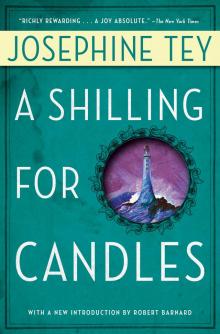 A Shilling for Candles
A Shilling for Candles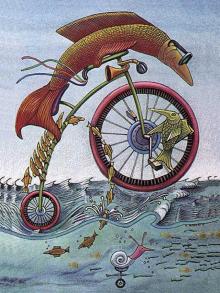 The Singing Sands
The Singing Sands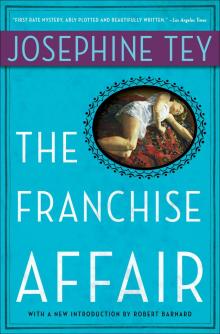 The Franchise Affair
The Franchise Affair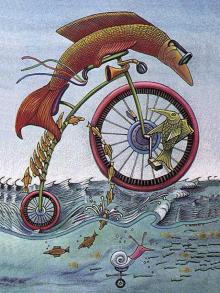 Daughter of Time
Daughter of Time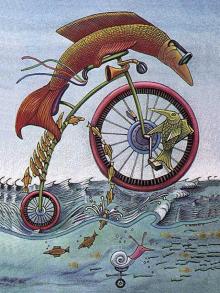 To Love and Be Wise
To Love and Be Wise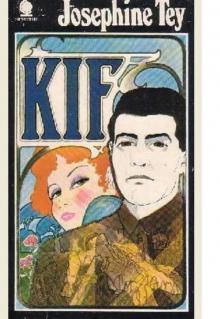 Kif
Kif The Expensive Halo: A Fable Without Moral
The Expensive Halo: A Fable Without Moral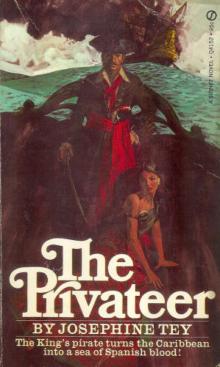 The Privateer
The Privateer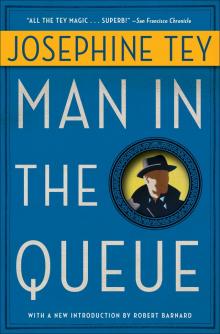 The Man in the Queue
The Man in the Queue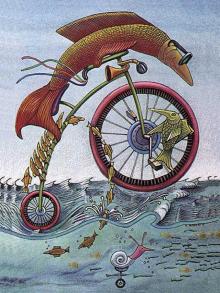 Miss Pym Disposes
Miss Pym Disposes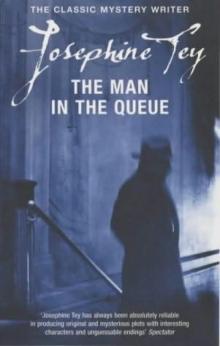 The Man in the Queue ag-1
The Man in the Queue ag-1 Brat Farrar
Brat Farrar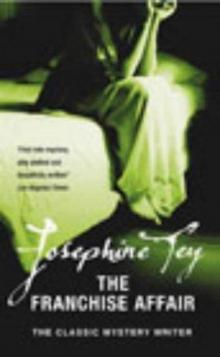 The Franchise Affair ag-3
The Franchise Affair ag-3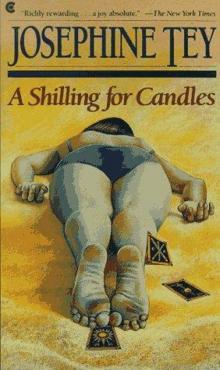 A Shilling for Candles ag-2
A Shilling for Candles ag-2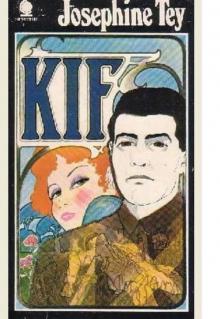 Kif: An Unvarnished History
Kif: An Unvarnished History The Expensive Halo
The Expensive Halo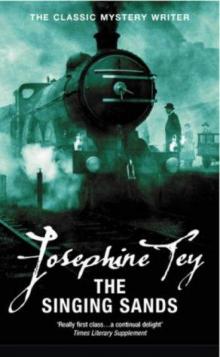 The Singing Sands ag-6
The Singing Sands ag-6 To Love and Be Wise ag-4
To Love and Be Wise ag-4